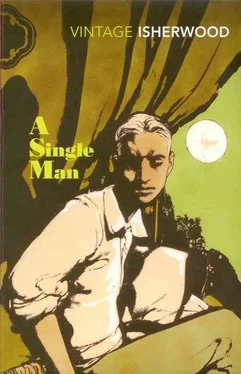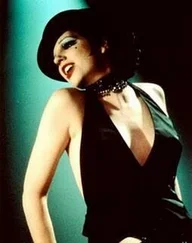And then the War’s end and the mad spree of driving up and down the highway on the instantly derationed gas, shedding great black chunks of your recaps all the way to Malibu. And then the beach-months of 1946. The magic squalor of those hot nights, when the whole shore was alive with tongues of flame, the watch-fires of a vast naked barbarian tribe – each group or pair to itself and bothering no one, yet all a part of the life of the tribal encampment – swimming in the darkness, cooking fish, dancing to the radio, coupling without shame on the sand. George and Jim (who had just met) were out there among them evening after evening, yet not often enough to satisfy the sad fierce appetite of memory, as it looks back hungrily on that glorious Indian summer of lust.
The hitch-hiking servicemen are few now and mostly domesticated; going back and forth between the rocket-base and their homes and wives. Beach-fires are forbidden, except in designated picnic-areas where you must eat sitting up on benches at communal tables, and mustn’t screw at all. But, though so much of the glory has faded, nevertheless – thanks to the persecuted yet undying old gods of disorder – this last block of Las Ondas is still a bad neighbourhood. Respectable people avoid it instinctively. Realtors deplore it. Property values are low, here. The motels are new but cheaply stuck together and already slum-sordid; they cater to one-night stands. And, though the charcoal remnants of those barbarian orgy-fires have long since been ground into the sand, this stretch of the shore is still filthy with trash; high-school gangs still daub huge scandalous words on its beach-wall, and seashells are still less easy to find here than discarded rubbers.
The glory has faded, too, from The Starboard Side; only a true devotee like George can still detect even a last faint gleam of it. The place has been stripped of its dusty marine trophies and yellow group-photographs. Right after the New Year it’s to be what they dare to call redecorated; that’s to say, desecrated in readiness for next summer’s mob of blank-faced strangers. Already there is a new juke-box, and a new television fixed high up on the wall; so you can turn half right, rest your elbows on the bar and go into a cow-daze, watching it. This is what most of the customers are doing as George enters.
He makes unsteadily but purposefully for his favourite little table in the corner, from which the TV screen is invisible. At the table next to him, two other unhypnotized nonconformists, an elderly couple who belong to the last handful of surviving colonists, are practising their way of love; a mild quarrelsome alcoholism which makes it possible for them to live in a play-relationship, like children. You old bag, you old prick, you old bitch, you old bastard; rage without resentment, abuse without venom. This is how it will be for them, till the end. Let’s hope they will never be parted, but die in the same hour of the same night, in their beer-stained bed.
And now George’s eyes move along the bar; stop on a figure seated alone, at the end nearest the door. The young man isn’t watching the TV; indeed he is quite intent upon something he is writing on the back of an envelope. As he writes, he smiles to himself and rubs the side of his large nose with his forefinger. It is Kenny Potter.
At first, George doesn’t move; seems hardly to react at all. But then a slow intent smile parts his lips. He leans forward, watching Kenny with the delight of a naturalist who has identified a rosy finch out of the high sierras on a tree in a city park. After a minute he rises, crosses almost stealthily to the bar and slips on to the stool beside Kenny.
‘Hello, there,’ he says.
Kenny turns quickly, sees who it is, laughs loudly, crumples the envelope and tosses it over the bar into a trash container. ‘Hello, Sir.’
‘What did you do that for?’
‘Oh. Nothing.’
‘I disturbed you. You were writing.’
‘It was nothing. Only a poem.’
‘And now it’s lost to the world!’
‘I’ll remember it. Now I’ve written it down.’
‘Would you say it for me?’
This sends Kenny into convulsions of laughter. ‘It’s crazy. It’s —’ he gulps down his giggles. ‘It’s a – a haiku! ’
‘Well, what’s so crazy about a haiku?’
‘I’d have to count the syllables first.’
But Kenny obviously isn’t going to count them now. So George says, ‘I didn’t expect to see you in this neck of the woods. Don’t you live over on the other side of town, near campus?’
‘That’s right. Only sometimes I like to get way away from there.’
‘But imagine your happening to pick on this particular bar!’
‘Oh, that was because one of the kids told me you’re in here a lot.’
‘You mean, you came out here to see me?’ Perhaps George says this a little too eagerly. Anyhow, Kenny shrugs it off with a teasing smile: ‘I thought I’d see what kind of a joint it was.’
‘It’s nothing, now. It used to be quite something, though. And I’ve gotten accustomed to coming here. You see, I live very close.’
‘Camphor Tree Lane?’
‘How in the world did you know that?’
‘Is it supposed to be a secret?’
‘Why no – of course not! I have students come over to see me, now and then. I mean, about their work —’ George is immediately aware that this sounds defensive and guilty as hell. Has Kenny noticed? He is grinning; but then he has been grinning all the time. George adds, rather feebly, ‘You seem to know an awful lot about me and my habits. A lot more than I know about any of you —’
‘There isn’t much to know about us, I guess!’ Kenny gives him a teasing challenging look. ‘What would you like to know about us, Sir?’
‘Oh, I’ll think of something. Give me time. . . . Say, what are you drinking?’
‘Nothing!’ Kenny giggles. ‘He hasn’t even noticed-me yet.’ And, indeed, the bartender is absorbed in a TV wrestling-match.
‘Well, what’ll you have?’
‘What are you having, Sir?’
‘Scotch.’
‘Okay,’ Kenny says, in a tone which suggests that he would have agreed just as readily to buttermilk. George calls the bartender – very loudly, so he can’t pretend not to have heard – and orders. The bartender, always a bit of a bitch, demands to see Kenny’s I.D. So they go through all of that. George says stuffily to the bartender, ‘You ought to know me by this time; do you really think I’d be such an idiot as to try to buy drinks for a minor?’
‘We have to check,’ says the bartender, through a skin inches thick. He turns his back on them and moves away. George feels a brief spurt of powerless rage. He has been made to look like an ass; and in front of Kenny, too.
While they are waiting for the drinks, he asks, ‘How did you get here? In your car?’
‘I don’t have one. Lois drove me.’
‘Where is she now, then?’
‘Gone home, I guess.’
George senses something not quite in order. But, whatever it is, Kenny doesn’t seem worried about it. He adds vaguely, ‘I thought I’d walk around for a while.’
‘But how’ll you get back?’
‘Oh, I’ll manage.’
(A voice inside George says, You could invite him to stay the night at your place. Tell him you’ll drive him back in the morning.
What in hell do you think I am? George asks it.
It was merely a suggestion, says the voice.)
The drinks arrive. George says to Kenny, ‘Look, why don’t we sit over there, at the table in the corner? That damned television keeps catching my eye.’
‘All right.’
It would be fun, George thinks, if the Young were just a little less passive. But that’s too much to ask. You have to play it their way, or not at all. As they take their chairs, facing each other, George says, ‘I’ve still got my pencil sharpener’, and, bringing it out of his pocket, he tosses it down on the table, as though shooting craps.
Читать дальше












